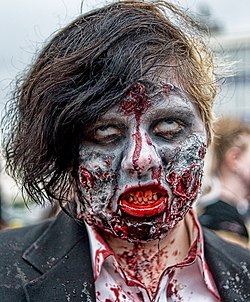Portal:Speculative fiction/Horror

Selected horror profile
Anne Rice (born Howard Allen Frances O'Brien, October 4, 1941-December 11, 2021) is an American author of gothic fiction, Christian literature, and erotic literature. She is perhaps best known for her series of novels, The Vampire Chronicles, revolving around the central character of Lestat. She began her professional writing career with the publication of Interview with the Vampire in 1976, while living in California, and began writing sequels to the novel in the 1980s. In the mid-2000s, following a publicized return to Catholicism, Rice published the novels Christ the Lord: Out of Egypt and Christ the Lord: The Road to Cana, fictionalized accounts of certain incidents in the life of Jesus.
Rice's books have sold nearly 100 million copies, placing her among the most popular authors in recent American history. While reaction to her early works was initially mixed, she became more popular with critics and readers in the 1980s. Her writing style and the literary content of her works have been deeply analyzed by literary commentators. In addition to her vampire novels, Rice has authored books such as The Feast of All Saints (adapted for television in 2001) and Servant of the Bones, which formed the basis of a 2011 comic book miniseries. Several books from The Vampire Chronicles have been adapted as comics and manga by various publishers. Rice has also authored erotic fiction under the pen names Anne Rampling and A. N. Roquelaure, including Exit to Eden, which was later adapted into a 1994 film. Selected horror workFriday the 13th is an American horror franchise that consists of eleven slasher films, a television show, novels, and comic books. The franchise is mainly based on the fictional character of Jason Voorhees, who drowned at Camp Crystal Lake as a boy due to the negligence of the teenage counselors. Decades later, the lake is rumored to be "cursed" and is the setting for a series of mass murders. Jason is featured in all of the films, either as the killer or as the motivation for the killings. The original film was written by Victor Miller, and was produced and directed by Sean S. Cunningham; later films brought in others for these positions. Originally created to cash in on the success of John Carpenter's Halloween (1978), the success led Paramount Pictures to purchase the full rights to the Friday the 13th franchise. Frank Mancuso, Jr., who produced the films, also developed the television show Friday the 13th: The Series after Paramount released what would be their last film. The television series is not connected to the rest of the franchise by any character or setting, but was created out of the idea of "bad luck and curses," which the film series symbolized. While the franchise was owned by Paramount, four films were adapted into novels, with the film Friday the 13th Part III receiving two separate adaptations. When the franchise was sold to New Line Cinema, Cunningham returned to oversee two additional films, and a crossover film with Freddy Krueger from another horror film series, A Nightmare on Elm Street. Under New Line, thirteen novellas and various comic book series were published featuring Jason Voorhees. The film series was never favored by critics, but still became a financial success at the box office. The franchise is considered one of the most successful franchises in American cinema thanks to the success of the films, but also because of the comic book, expansive merchandising that includes various toylines, video games, soundtrack releases and references in popular culture. In addition, the franchise tops other American horror franchises in adjusted 2008 dollars for box office gross. Horror topics
|


